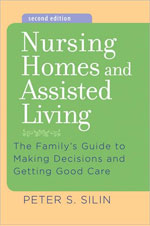The Importance of Assessments
Last week I received a call from a man whose mother is in a nursing home. She has been there for several years. He told me that about a year ago the staff had asked him to hire a companion because his mother had been taking so long to eat in the dining room, and because she seemed to be alone much of the time. He hired a companion, and gradually the time he had her increased to six hours a day. That combined with the fees of the home were more than she could afford.
I went to see Mrs. L. a couple of times. The first time, I went in while she was in the dining room. She is a tiny little thing with silver gray hair and large violet eyes. The staff told me she is 94, but it turns out she is 97. She is mostly blind, and very hard of hearing. Her hired companion was there, trying to encourage her to eat.
The second time I went in, I saw her in her room. When I sat down with her, I asked her about her eating. She said she has no appetite. Later, she told me she did not feel much like doing things these days. Finally, I asked her about her mood. "Down in the dumps," she told me. How long had she been feeling like this? "Ever since my husband died." She couldn't remember how many years ago that had been. I asked her what year it is now. "1986," she told me.
"I shouldn't be feeling this way," she said, "I should want to do something, but I don't "
When I said I thought she is depressed, she agreed. I asked her if she was willing to take something for it, and she agreed.
Later, I read through the chart with the nurse. She has had recent blood work, so it doesn't appear that there is an acute medical problem. I talked to the pharmacist about her medications, who said that they are appropriate for her diagnosis, and shouldn't cause loss of appetite, or change in taste, as some do. She has lost 9 kg. over the past couple of years.
I flipped back in the chart. At the beginning, was an intial diagnosis of mild depression. The early pages of the chart were thinned, but looking at what was there, I could see no history of anti-depressants.
I understand that this woman has some major issues which would affect her mood--visual and hearing impairment. Moderate memory loss could also be affecting her. This makes it more difficult for her to be able to partake in anything or be with many people. And I know she is 97. But still, we can still do a further assessment and perhaps ask the physician for an order for some antidepressants. But because there are dietary, medical, recreational, social, and family concerns, the first thing we need to do is have a care conference. With all the players in the room, including Mrs. L. if she will attend, we can really try to figure out what is happening to her.
The point here is that Mrs. L.'s son had been asked to spend close to $2500.00 per month for added help for his mother, without having had an assessment of what the real problem is. Having a companion may be a wonderful adjunct to Mrs. L.'s life but she probably does not need someone to help her eat. A good assessment should have been done first.
Unfortunately, this kind of thing happens frequently in senior's housing and nursing homes. Easy solutions are chosen, without complete assessments.
So what can family members do? Always ask why--why is the problem occurring. Then ask what--what kind of assessment have they done t o figure out how they found the why?




<< Home